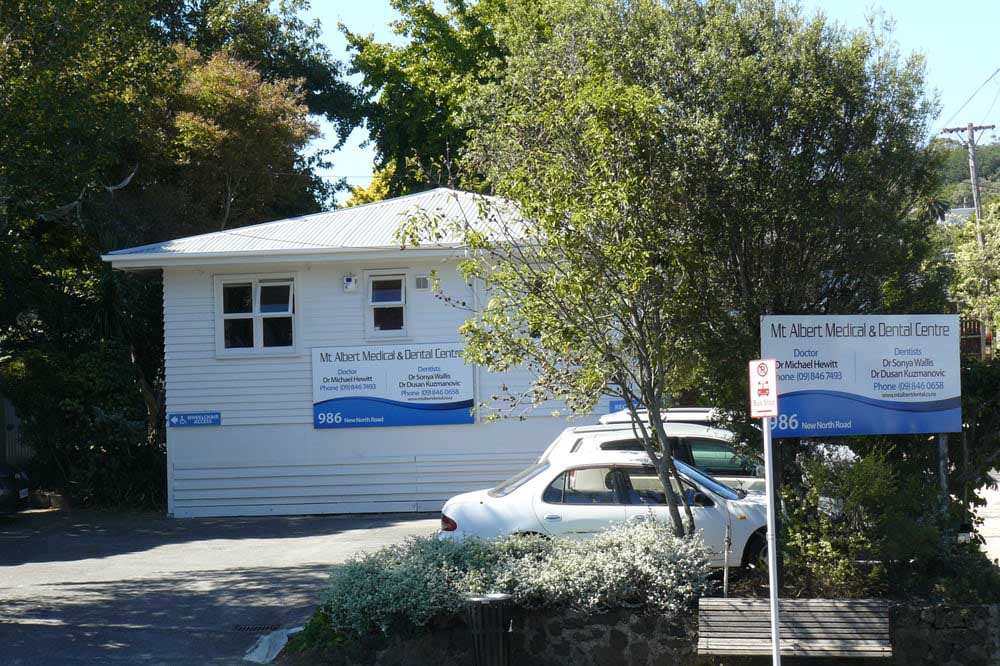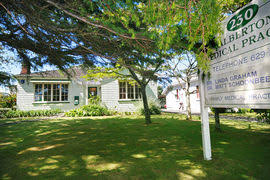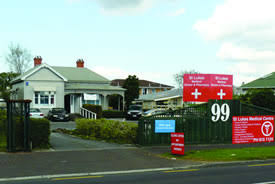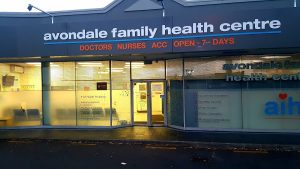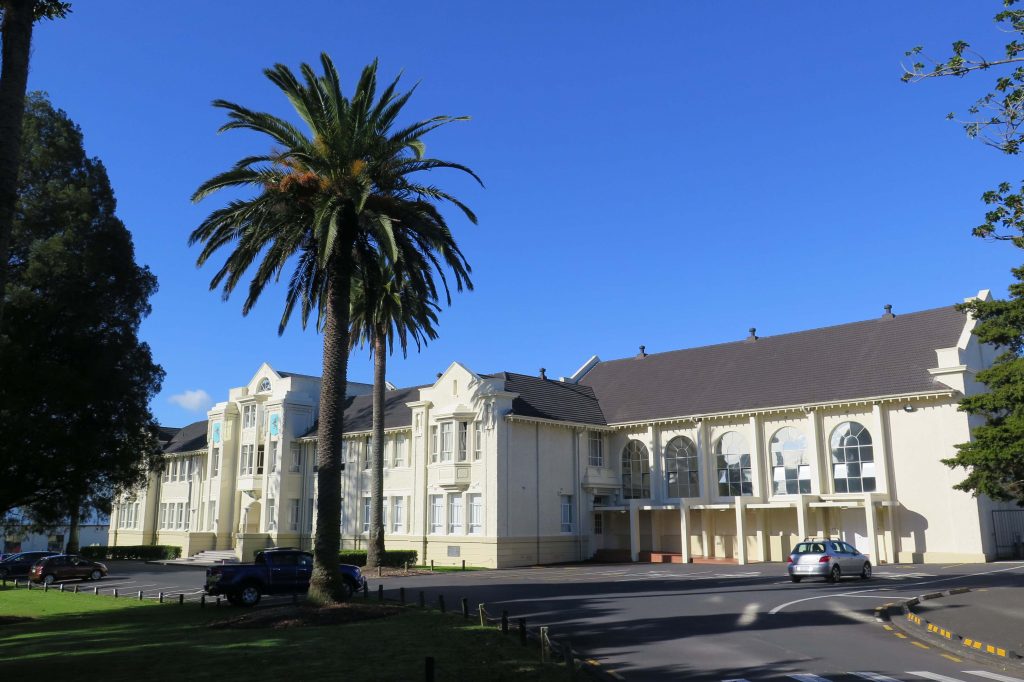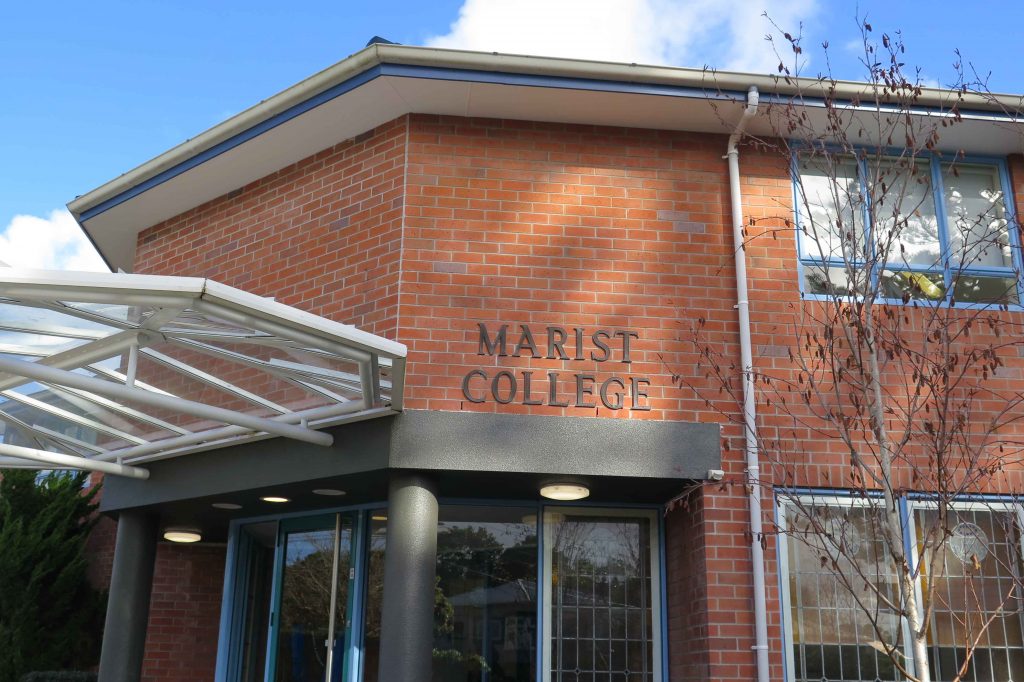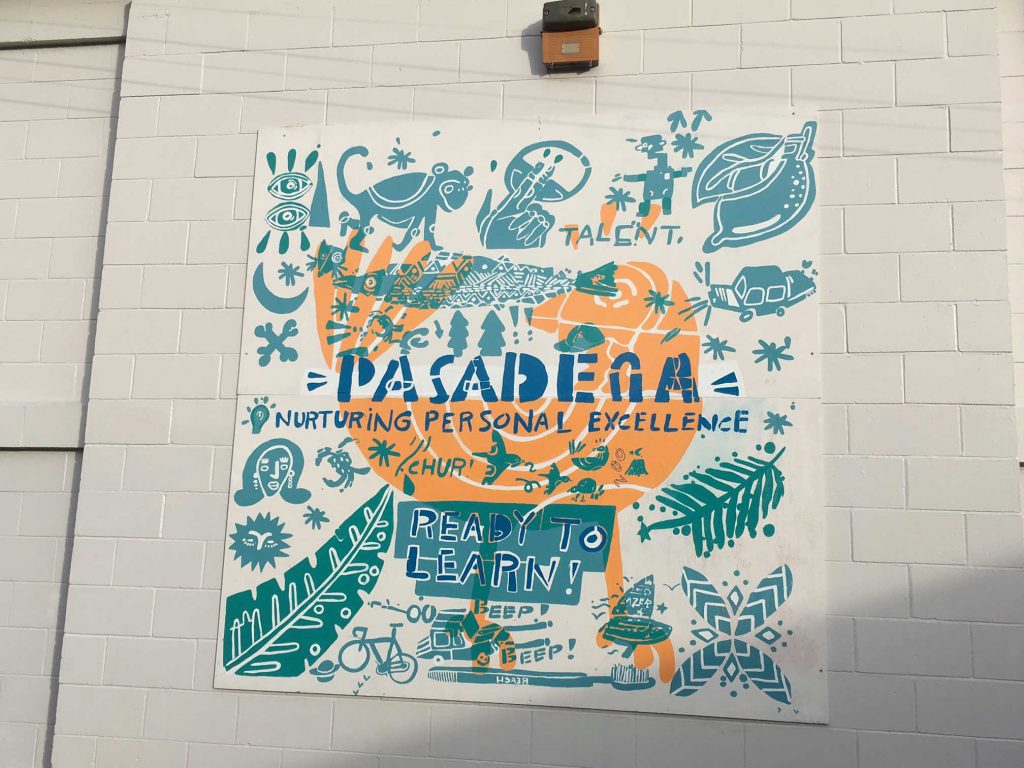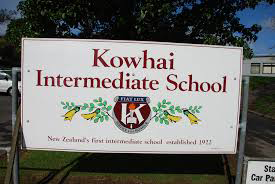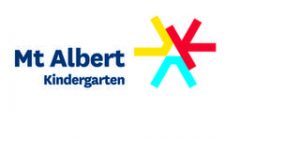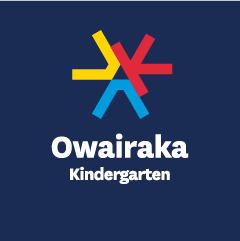YOUR LOCAL GPs
Fees, opening hours, doctors’ names and other details have been taken from websites and may be subject to change, especially after the 2017 general election where both major parties pledged to increase patient subsidies to doctors. This page will be updated in due course, but please check details before you make a commitment.
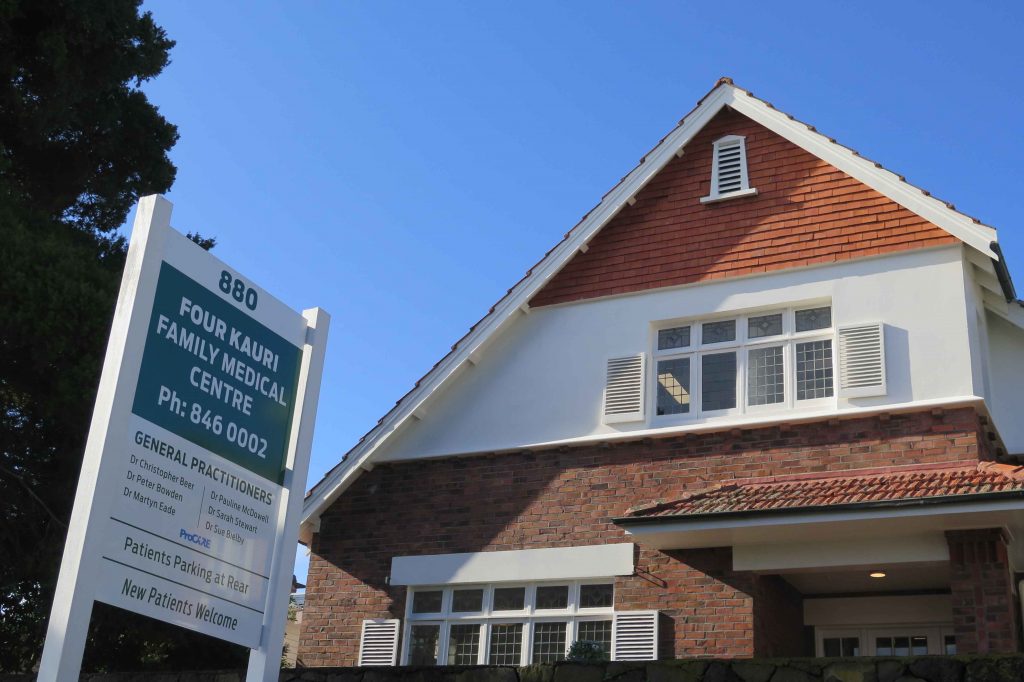 Four Kauri Family Medical Centre
Four Kauri Family Medical Centre
880 New North Rd; Phone: 846 0002; Hours: 8.30am-6pm, Monday to Friday; Download website
GPs: Dr Chris Beer, Dr Peter Bowden, Dr Martyn Eade, Dr Pauline McDowell, Dr Sarah Stewart
Fees: Adult, $43; child under 13, free; Languages spoken at practice: English
Mt Albert Medical Centre
986 New North Rd; phone: 846 7493; Hours: 9am-5.30pm, Monday, Tuesday, Thursday, Friday; 9am-1pm (Wednesday). Doctor not available between 12.45pm and 3pm; Download website
GP: Dr Michael Hewitt
Fees: Adult, $47; child under 13, free; Languages spoken at practice: English, Chinese, Mandarin
Alberton Medical Practice
230 Mt Albert Rd, Sandringham; phone: 629 2088; hours: 8.30am-5.30pm, Monday to Friday; Download website
GPs: Dr Linda Graham, Dr Elizabeth Jelleyman, Dr Leonie Russell, Dr Matthew Schoonbee
Fees: Adult, $46 (65+ $38); child under 13, free; Languages spoken: English
St Lukes Medical Centre
99 St Lukes Rd, Sandringham: phone: 815 1124; Hours: 9am-5.30pm, Monday to Friday; 9am-3pm Saturdays. Download website
GPs: Dr Bashir Ahmed, Dr Mahlaqa Husain
Fees: Adult, $17.95 (additional charge at weekends); child under 13, free; Languages spoken: English, Bangla, Bengali, Hindi, Indian, Telugu
Unitec Student Health
Building 28 Room 1023, Unitec, Mt Albert Campus, Carrington Road: phone: 815 4321, ext 7248; hours: 8am-4pm, Monday to Friday (reduced hours during semester breaks): Download website
GPs: Dr Suzanne Cutmore, Dr Yvonne Greenfield, Dr Sally McLaren
Fees: $8 (for enrolled students)
White Cross Accident and Medical
52 St Lukes Rd; phone: 815 3111; hours: 8am-8pm seven days a week: Download website
GPs: Qualified and experienced doctors always available
Fees: Adult, $61 (before 6pm). After 6pm and at weekends, $87. Child under 13, $5.
Avondale Family Health Centre
1784 Great North Rd, Avondale; phone: 820 0065 or 820 0526; hours: 8am-8pm, Monday to Friday; 9am-2pm, Saturdays and Sundays: Download website
GPs: Dr Dahrif Fattah, Dr Coral Fonseca, Dr Nalini Hillman, Dr William Kim, Dr Nam Kim, Dr Mohammad Nuruzzaman, Dr Andre Pevroux, Dr Glenn Reeve, Dr Devarani Sritharan, Dr Percy Wu
Fees: Adult, $17; child under 13, free; Languages spoken: Cantonese, Chinese, English, Mandarin, Bengali
Avondale Health Centre
39 Layard St, Avondale; phone: 828 2066; hours: 8am-5pm, Monday to Friday: Download website
GPs: Dr David Hoadley, Dr Elizabeth McLeay, Dr Carolyn Sutton, Dr Tony Svensen
Languages spoken: English
Fees: Adult, $38 (65+, $35); child under 13, free
Doctors at Kingsland
491A New North Rd, Kingsland; phone: 846 2296; hours: 8.30am-4pm, Monday to Friday: Download website
GPs: Dr Peter King, Dr James Lowe, Dr Hugh Sung
Fees: Adults, $18; child under 13, free; Languages spoken: English, Korea
Kingsland Family Health Centre
495 New North Rd, Kingsland; phone: 815 1475; hours: 8am-5.30am, Monday to Friday: Download website
GPs: Dr Graham Gulbransen, Dr Fiona Watt, Dr Richard Watt
Fees: Adults, $50; child under 13, free; Languages spoken: English
Pt Chevalier Medical and Surgical Centre
1181 Great North Rd, Pt Chevalier: phone: 846 6244; hours: 8am-5.30pm, Monday to Friday; 9am-11am, Saturday: Download website
GPs: Dr Towhidul Islam, Dr Charles Skinner, Dr Jim Wernham
Fees: Adults, $40; child under 13, free; Languages spoken: English
YOUR LOCAL SCHOOLS
Secondary schools
Mt Albert Grammar School (MAGS)
(State co-ed secondary school – taking boarders – with enrolment zone and roll of about 3000): Headmaster: Patrick Drumm
Alberton Avenue, Mount Albert, Auckland 1025; E: enrol@mags.school.nz Phone: 846 2044 Download website
School zone: Go to this link
ERO:
From the last ERO report (April, 2018): “The school is highly effective in achieving equitable and excellent outcomes for its students. It has the capacity and capability to accelerate learning for all learners and is successfully addressing parity issues for some groups of students…
“School leadership and stewardship, teacher capability and the improvement-focused learning culture are highly effective school conditions that enable students’ achievement of equity and excellence.
“Leaders deliberately promote equity and excellence through personalised approaches to learning. The opportunity for individualised programmes is a key driver in the school’s new strategic plan. Leaders at all levels of the school are successfully promoting a collaborative and reflective teaching culture that encourages and supports students to achieve their personal best.
“Teachers continue to grow their capability and trial ways to support students who need to make accelerated shifts in their learning…
“The school has a learning culture that promotes and fosters student well-being for learning. A wraparound approach to pastoral care and the use of restorative practices support student management.”
Marist College
(Catholic secondary school for girls with no zone and a roll of about 750): Principal: Monica Johnson
31 Alberton Ave, Mt Albert, Auckland 1025; E: school-secretary@maristcollege.school.nz Phone: 846 8311 Download website
ERO:
From the last ERO report (June 2014): “Marist College continues to be a high performing school, and provides high quality education for all students. The Marist Catholic character is central to the school’s success. Students experience highly effective teaching. They are supported to achieve personal excellence and to become capable, competent women. The school is very well led and governed.
“…Many staff and school leaders are long-serving, and the school has a good balance of experienced and new teachers. Staff and leadership stability, ongoing family connections, and the presence of the Marist Sisters, promote pride in the school’s history. The school benefits from its strong links with parents and its local community. It provides an inclusive and welcoming environment for all students, including those with special education needs. These good practices support the school’s family values, and promote students’ sense of belonging in the school.”
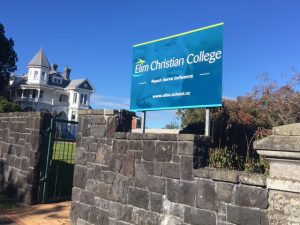 Elim Christian College (previously Hebron Christian College)
Elim Christian College (previously Hebron Christian College)
State-integrated Christian school catering for primary and secondary students, with a role of about 230. No zone. Principal: Murray Burton
I McLean St, Mt Albert, Auckland 1025: phone:(09) 846 2159. Download website
ERO (as Hebron):
From the last ERO report (August 2013): “Students achieve very well in National Standards in reading, writing and mathematics. Student achievement in National Certificates of Educational Achievement (NCEA) is high and includes substantial proportions of students gaining merit and excellence endorsements and university entrance.
“Distinctive features of the curriculum are the school’s high expectations for every student to achieve excellence, its inclusiveness, and parent and community involvement. Students with special needs and abilities are very well catered for, as are students who do not have English as their first language. Economically and socially disadvantaged students are well supported. The school partners with parents to meet the unique needs of each child. Community volunteers are valued members of the school community and their contribution includes careers guidance and counselling services.
“The school has suitable standards of tuition. Effective teaching is reflected in the settled and purposeful classroom environments. Students are well behaved and quickly develop a strong work ethic. Teachers provide well planned learning programmes that are enriched by the school’s special character and the many co-curricular activities, especially music and performing arts…
“The school has knowledgeable and qualified teachers who are open to new ideas that will benefit student learning and achievement.”
Intermediate schools
Pasadena Intermediate School
(State intermediate school for year 7-8 students, with no zone and a roll of about 330): Principal: Jonathan Hughes
Moray Place, Pt Chevalier, Auckland 1022; E: office@pasadena.school.nz Phone: 846 2169 Download website
ERO:
From the last ERO report (February 2015): “Pasadena Intermediate School focuses on equipping students with skills and competencies to be confident, life-long learners. Students learn in a respectful and caring environment in which they take responsibility for themselves and their learning. Students benefit from the individualised, inquiry approach to learning. The school is well led and governed.
“…A distinctive feature of the curriculum is the individualised learning programmes. These are facilitated by the extensive use of digital technologies and inquiry learning and teaching approaches.
“The on-line learning approach is helping students to develop ownership of their learning. Students are gaining the skills to know how they learn and direct their own learning. As a result, they are more self-reliant, motivated and inquiring learners. Teachers continue to review and develop the school curriculum so that it is authentic, meaningful and relevant to students. They are open to new learning. Teachers continue to deepen their understanding of inquiry learning to encompass all learning areas of The New Zealand Curriculum.
“The principal is strengthening management systems to encourage greater consistency in effective programme design and teaching practice.”
Kowhai Intermediate
(State intermediate school for year 7-8 students, with an enrolment zone and a roll of about 515): Principal: Louise Broad
26 Onslow Rd, Sandringham, Auckland 1024: E: admin@kowhai.school.nz Phone: 846 7534 Download website
School zone: Download this link
ERO:
From the last ERO report (May 2016): “The board of trustees, school leaders and staff share a strategic vision of education that promotes learners who are confident, self-directed and responsive to challenge and change. Students respond positively to an innovative learning culture that emphasises thinking skills. Parents comment on the confidence these learning approaches instil in their children.
“…The school uses achievement information very well to support learners’ engagement, progress and achievement. Students are highly engaged in their learning. They make good progress and generally achieve very well. Students work collaboratively with teachers and their parents to understand their own learning and are able to establish and review personal learning goals.
“…The school’s culture and values promote success for all students. Well managed programmes and in-class support for children with special learning and behaviour needs are a feature of the school. The school-wide programme for positive behaviour supports students’ engagement in learning. Positive relationships and restorative practices enhance students’ wellbeing, self-worth and sense of belonging.
“…The school is well placed to sustain and improve its performance. The school is capably led at all levels by the board of trustees, senior and whānau leaders, teachers, support staff and students. A positive school culture based on collaboration and strong relationships is supporting the learning of all students.”
Wesley Intermediate
(State intermediate school for year 7-8 students, with roll of about 120. No zone): Principal: Nigel Davis
766-778 Sandringham Road, Mt Roskill, Auckland 1041: E: admin@wesleyintermediate.school.nz Phone: (09) 620 9367 Download website
ERO:
From the last ERO report (February 2016): “The school has effectively addressed its priorities for review and development.
“School leaders, trustees and teachers have made considerable progress in improving outcomes for learners. The board, school leaders and LSM (Limited Statutory Manager) have developed strong and positive working relationships that are respectful and inclusive. The LSM has been highly effective building governance and leadership capability within the school.
“A large part of the school’s improvement has come through a unity of purpose and maximising the use of the skills and talents of trustees, staff and students. High levels of trust are now balanced with more robust systems for school accountability and for reviewing student achievement.
“School leaders have changed the way the school is organised. Most students now have the same teacher over the two years. Communication between the school and home has strengthened with teachers taking more responsibility for the engagement, progress, wellbeing and achievement of individual students.
“…The school now has a broader approach to identifying students’ strengths and learning requirements. Leaders have designed very effective systems to collate, monitor and review student progress. Teachers use data better to inform their teaching. Most teachers have also improved the way they share achievement information with students.
“Students set more meaningful and relevant learning goals. They are more confident learners… Students have a greater sense of ownership and responsibility for their own learning. They show an optimism for their future…”
Primary schools
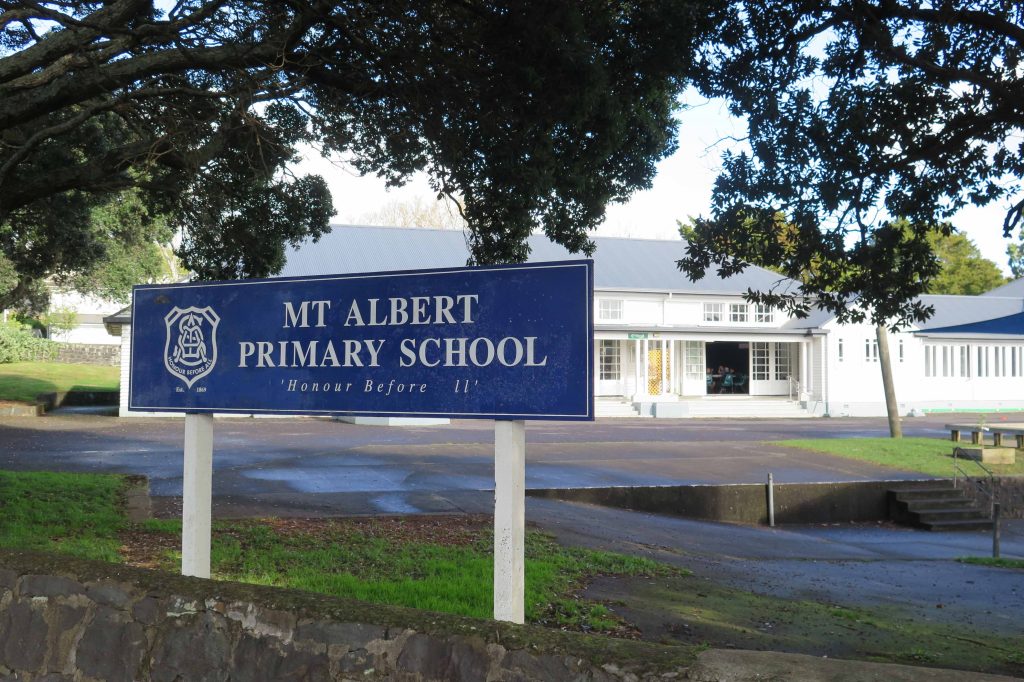 Mt Albert Primary
Mt Albert Primary
(State primary school, now with a zone, and a roll of about 455): Principal: Marian Caulfield
6 Sainsbury Rd, Mt Albert, Auckland 1025: E: reception@maps.school.nz phone: (09) 8469288. Download website
School zone: Download this link
ERO:
The latest ERO report (August 2016) says: “The 2013 ERO report noted that students enjoyed a friendly and inclusive learning environment. However, the report highlighted concerns about curriculum leadership, the use of student achievement information, and the quality of governance and management practices. For these reasons ERO decided to continue to monitor the school’s progress through a longitudinal review process…
“Stronger curriculum leadership is having a positive impact on learners. Different teaching approaches are increasing students’ understanding of the role they can play in the learning process. As a result, students have greater ownership of their learning and achievement outcomes. School leaders are now well placed to revisit the school curriculum documentation so that it provides coherent guidelines and direction for teachers, parents and students.
“The school has improved the use of achievement information to support better learning outcomes for students. There is now a shared ownership of achievement information by school leaders. Leaders have grown their capability to analyse data and inquire into patterns and trends. The school has good systems to support reliable, well evidenced, teacher judgments in relation to the National Standards. Student progress and achievement information is shared with students at class level and used as evidence in professional discussions.”
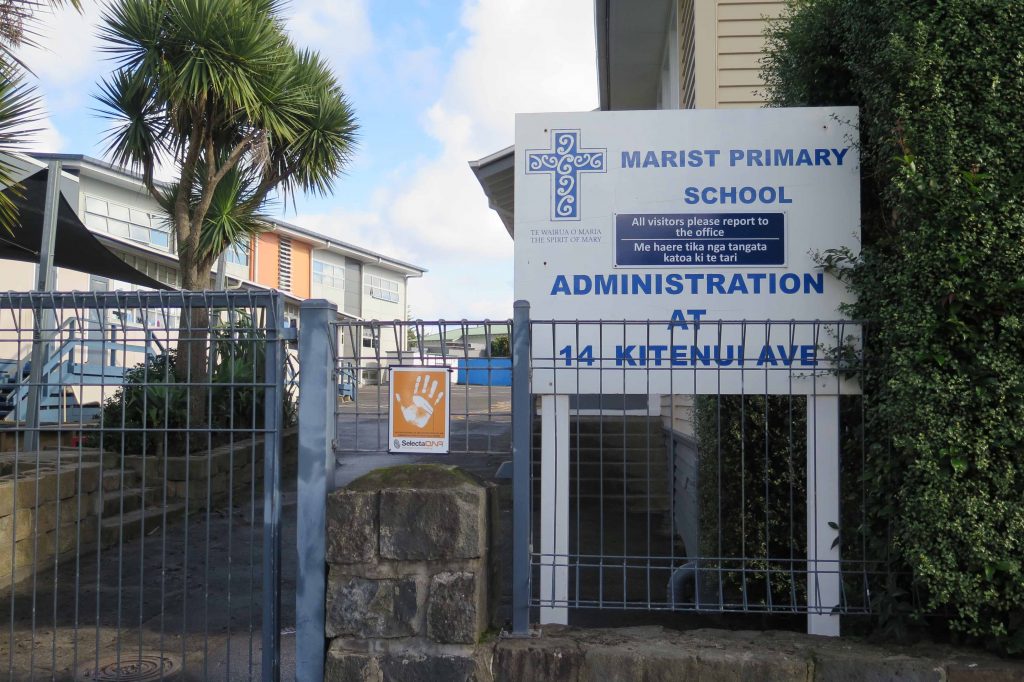 Marist School
Marist School
(Catholic primary school with no zone and a roll of about 300): Principal: Catherine Ryan
14 Kitenui Avenue, Mt Albert, Auckland 1025: E: office@marist.school.nz Phone: 846 7408 Download website
ERO:
From the last ERO report (June 2014): “Students are highly engaged and motivated to learn. Student engagement in learning is supported by very respectful relationships between teachers and students. Students see themselves as capable learners and they support the learning of their peers.
School achievement information about National Standards shows that a significant majority ofstudents, including Māori and Pacific, consistently achieve well in relation to the National Standards in reading, writing and mathematics. School data indicates the achievement of students is higher than regional and national cohorts.
… Teachers are capable, confident and highly skilled practitioners, who manage their classrooms effectively. They are eager to implement the updated and appropriate expectations of the new school curriculum direction. Some teachers already give students
more opportunities to make decisions about their learning.
… Students benefit from good quality teaching and are responding well to a curriculum that is becoming increasingly student centred and appropriate for the 21st century learner.”
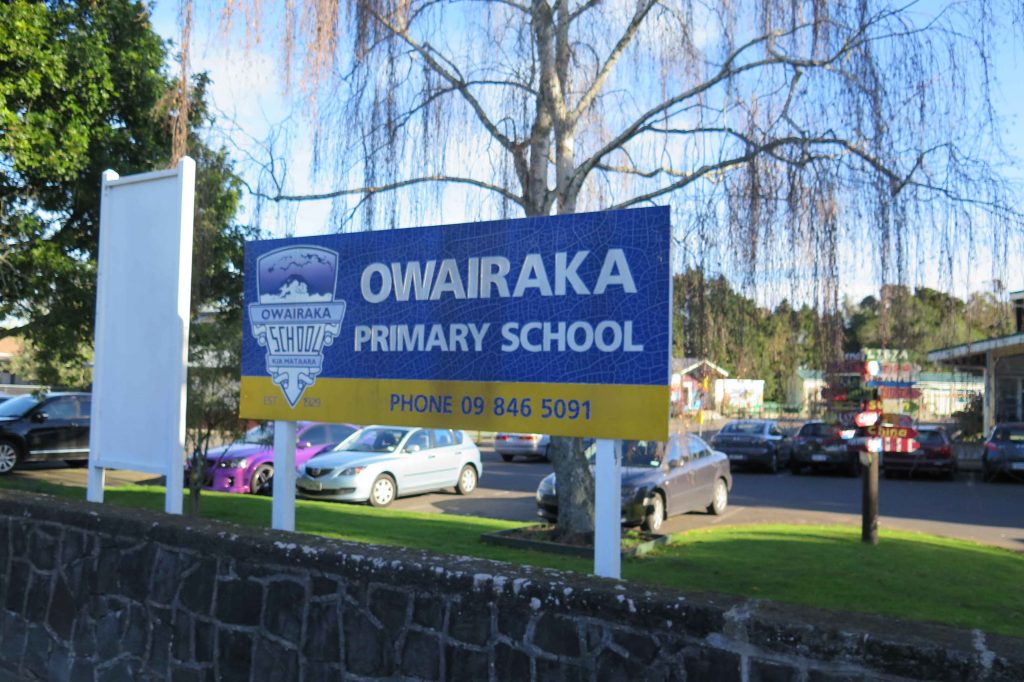 Owairaka District School
Owairaka District School
State primary school with an enrolment zone (see zone boundaries below) and a roll of about 500: Principal: Brenda Williams
113-115 Richardson Rd, Mt Albert, Auckland 1025: E: principal@owairaka.school.nz Phone: 846 5091 Download website
School zone:
“Starting at the intersection of New North Rd (1237-911, 1288-910 included) and Blockhouse Bay Rd (excluded), travel north-west along New North Rd and south-east along Mt Albert Rd (164, 179 and below included) to Owairaka Ave. Travel west along Owairaka Ave, south along Hallam St and west along Hendon Ave to Richardson Rd (198, 195 and above included). Continue west and then north along Hendon Ave and south-west along New North Rd, back to the starting point.”
ERO:
From the last ERO report (November 2015): “Community engagement is a positive feature of this school. Families, including many who are new to New Zealand, report having a sense of belonging in the school. Parents take good advantage of the invitation to engage in and contribute to school life.
“The school vision is to ‘grow great learners’ through a positive and nurturing learning culture. The ‘You can do it’ school philosophy is founded on the concepts of getting along, organisation, persistence and confidence. These foundations contribute to the development of students’ resilience. The school prioritises supporting students to be socially well prepared for life.
“…Students learn in settled and purposeful classes. Attractive classroom environments support and celebrate their learning. Teachers are well organised and prepared for the school day.Students have a good understanding of the routines of the class and staff expectations of them as learners. As a result,good use is made of class time for teaching and learning.
“…Families that attend the school bring a rich diversity of culture and experience with them. Many groups provide options for students to learn about their own or other cultures. The school acknowledges and celebrates the diversity of the community. The fale provides a focal point for many Pacific and other events.
“…Owairaka District School embraces its multicultural community… A positive learning culture supports students and staff to be successful, active and confident learners… “
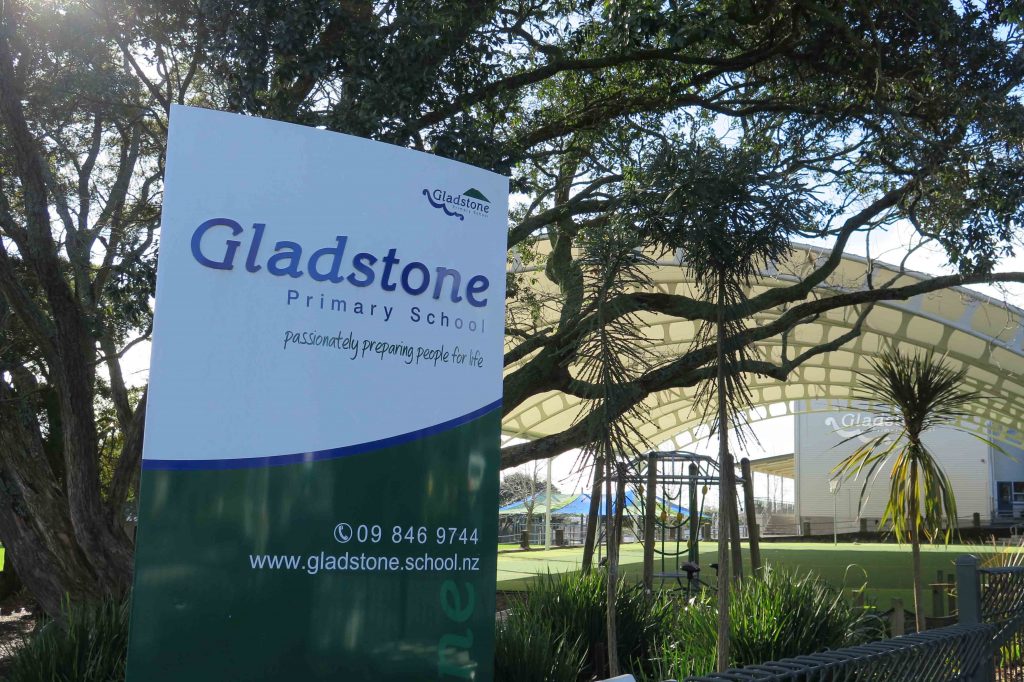 Gladstone School
Gladstone School
(State primary school with roll of about 920 and a zone): Principal: Dave Shadbolt
8 Seaview Terrace, Mt Albert, Auckland 1025; E: info@gladstone.school.nz Phone: 846 9744 Download website
School zone (a 2017 amendment took away the Unitec land from the zone. While that land has no residential housing at the moment, the medium term plan is for up to 3000 new homes there ):
All these streets are included: Alberton Ave, Alexis Ave, Allendale Rd, Amandale Ave, Ambrose St, Asquith Ave, Baldxwin Ave, Benfield Ave, Bennett St, Braemar Tce, Burch St, Burnside Ave, Carrington Rd, Caughey Pl, Challinor Cres, Chatham Ave, Counsel Tce, Doreen Ave, Fairleigh Ave, Ferner Ave, Fifth Ave, Fontenoy St, Fowler Ave, Francis Ryan Cl, Grant St, Guardwell Tce, Harbutt St, Henry Louis Crt, Jennings St, Jerram St, Jersey Ave, Jesmond Tce, Kerr-Taylor Ave, Kitenui Ave, Knight Ave, Laurel St, Leone Tce, Linwood Ave, Lloyd Ave, Mark Rd, Margaret Ave, Martin Ave, Maybeck Rd, McLean St, Monaghan Ave, Mt Albert Rd (1-103 and 2-90), Norgrove Ave, Norrie Ave, Novar Place, Newcastle Tce, New North Rd (690-1080 and 745-1079), Oakfield Ave, Parkdale Rd, Parr Rd South, Phyllis St, Prospero Tce, Raetihi Cres, Ranleigh Rd, Rawalpindi St, Renton Rd, Rhodes Ave, Richardson Rd (2-18 – even numbers only), Rossgrove Tce, Sadgrove Tce, Seaview Tce, Segar Ave, Springleigh Ave, Stillwell Rd, Summit Dr, Sutherland Rd, Tasman Ave, Thomas Ave, Toroa Tce, Verona Ave, Violet St, Wairere Ave, Wesley Ave, Willcott St, Willis St, Woodward Rd.
ERO:
From the last ERO report (October 2013): “The shared vision of the Gladstone learner who is ‘inspirational, innovative, socially just and academically powerful’ is clearly articulated by the leadership team and supported by parents, teachers and students.
“…A positive and inclusive tone in the school supports the learning of all students. Strong relationships and connections underpin all practices. School leaders encourage an open-door policy to foster relationships with families to support students’ individual pastoral and academic needs. Students, teachers and parents value being members of the school community and demonstrate a sense of pride in the school.
“…The school’s curriculum promotes and supports student learning very effectively. The curriculum provides an extensive range of learning opportunities at all levels of the school. It caters well for diverse groups of students in inclusive ways and provides opportunities for students to develop and demonstrate leadership. Students’ ideas are valued by staff and they are encouraged to make decisions about their learning.”
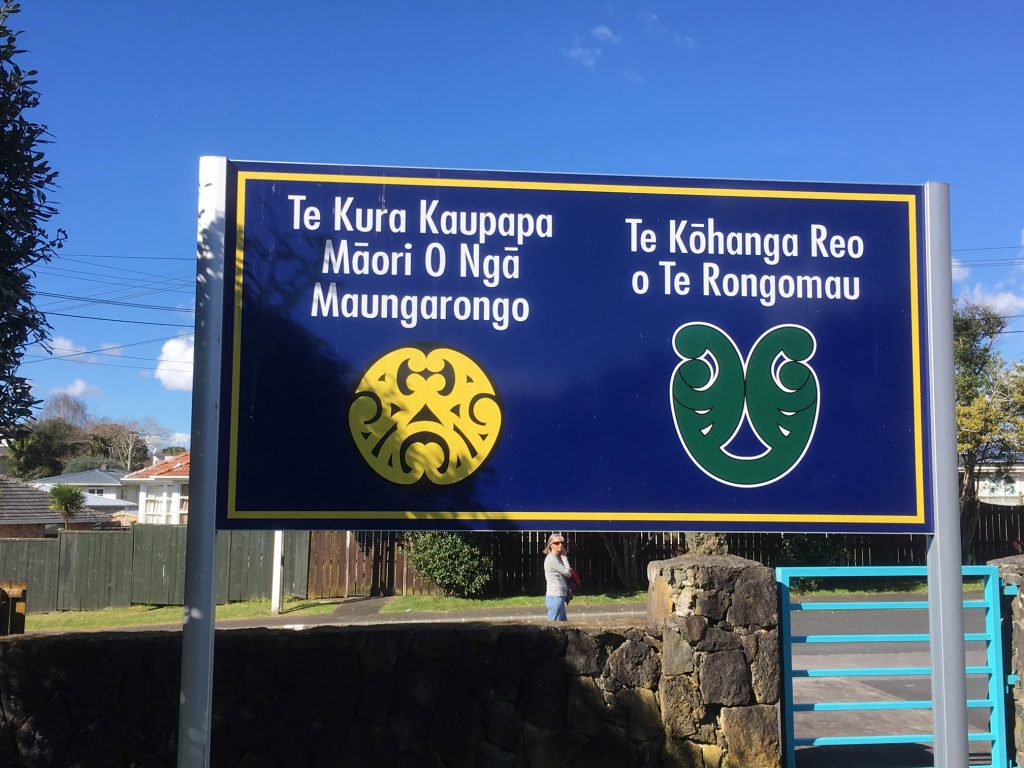 Te Kura Kaupapa Maori o Nga Maugarongo
Te Kura Kaupapa Maori o Nga Maugarongo
(A primary school with a roll of about 100 that provides total immersion of Te Reo Māori and teaches Māori values, philosophies, principles and practices.)
140 Haverstock Road, Mt Albert, Auckland 1025; phone (09) 815 6983 Download website
ERO:
From the last ERO report (February, 2015): “Students are enthusiastic learners. Students enjoy respectful and caring interactions and relationships with kaimahi and whānau. A calm and whānau-based context enables students to learn their language, culture and identity in meaningful and purposeful ways…Students thrive in an environment where there is a strong commitment to te reo Māori me ōna tikanga. Te reo Māori is normalised and spontaneous.
“Students are articulate, confident and proficient in te reo… Students have access to an extensive range of te ao Māori and te ao whānui experiences. These help students to understand, explain and explore the world around them and their place within it…
“A feature of teaching and learning in the kura is the high level of fluency and proficiency that students have in te reo Māori. Students engage in a wide range of discussions and conversations about their learning around specific themes. They confidently challenge each other and provoke further thinking.
“They are open and responsive to questions and to challenges about their thinking and ideas. Students are positive and respectful towards their peers and others.”
Kindergartens:
Kindergartens are open to children aged from 3 to 5. They don’t have zones, but do have relatively small rolls. Often there is a waiting list and children may not be accepted from age 3. But as older children move on to primary school, there is a constant stream of openings. If one of the local kindergartens can’t take your three-year-old, try the Auckland Kindergarten Association (373 5635) or download their website
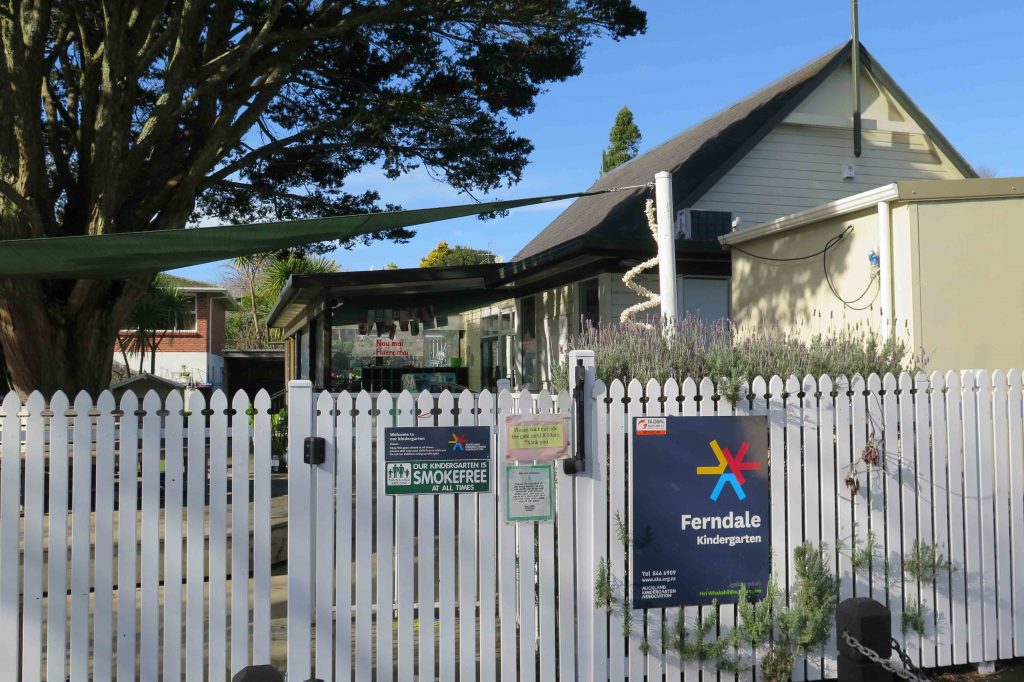 Ferndale Kindergarten
Ferndale Kindergarten
(Free kindergarten, part of the Auckland Kindergarten Association, with roll of about 55). 830 New North Rd, Mt Albert, Auckland 1025; E: ferndale@aka.org.nz Phone: 846 6909 Download website
ERO:
From the last ERO report (February 2014): “Children attending the centre are very capable and enjoy the spacious, richly resourced environment. They share their ideas confidently with each other and adults. They sustain their play well, particularly when their learning is extended through their own interests.
“Teachers have warm relationships with children and families. Children have positive relationships with each other, and many play in friendship pairs or small groups. Children demonstrate good social skills such as inclusiveness, turn-taking, and empathy. They are supported very well by teachers to develop these skills.”
Mt Albert Kindergarten
(Free kindergarten, part of the Auckland Kindergarten Association, with roll of about 50). 24 Mark Road, Mt Albert, Auckland 1025; E: mtalbert@aka.org.nz Phone: (09) 846 4379 Download website
ERO:
From the last ERO report (February 2014): “Mt Albert Kindergarten has a welcoming, positive tone where children are affirmed and supported in their play. Children are articulate and confidently engage in conversations with each other and with adults. Parents report that they feel welcomed and are comfortable with contributing to the kindergarten’s programme.
Children settle quickly and confidently into the kindergarten programme. A rich, meaningful and stimulating environment is evident. The centre provides a wide variety of age-appropriate and inviting resources in discrete areas of play. Children freely choose from the many activities and resources that support their current interests. Teachers provide good opportunities to encourage children to develop their leadership qualities.”
Owairaka Kindergarten
(Free kindergarten, part of the Auckland Kindergarten Association, with roll of about 60). 6a Dunkirk Terrace, Owairaka, Auckland 1025; E: owairaka@aka.org.nz Phone: (09) 846 5476 Download website
ERO:
From the last ERO report (September 2014): “Children learn in a stimulating, well resourced environment that reflects teacher’s commitment to biculturalism, children’s multiethnic backgrounds, and to environmental sustainability. Indoor and outdoor play spaces are inviting and promote opportunities for physical challenge, imaginative play and natural science exploration. Children show care and ownership of the environment and demonstrate an enthusiasm for learning.
“Curriculum planning and implementation is underpinned by respectful relationships, the kindergarten’s philosophy and by Te Whāriki, the early childhood curriculum. Teachers are responsive, inclusive, and actively seek ways to promote children’s learning. They plan programmes based on children’s ideas and emerging interests. Children’s portfolios show how their strengths and dispositions have been developed over time. Teacher planning also includes links to the kindergarten’s strategic plans. Parent and whānau involvement in, and feedback about, the programme is encouraged and valued.”
Value of an ERO report
The purpose of ERO’s reviews is to give parents and the wider school community assurance about the quality of education that schools provide and their children receive. An ERO school report answers the question “How effectively is this school’s curriculum promoting student learning – engagement, progress and achievement?” Under that overarching question ERO reports on the quality of education and learning outcomes for children and for specific groups of children including Māori students, Pacific students and students with special needs. ERO also reports on the quality of the school’s systems for sustaining and continuing improvements.

